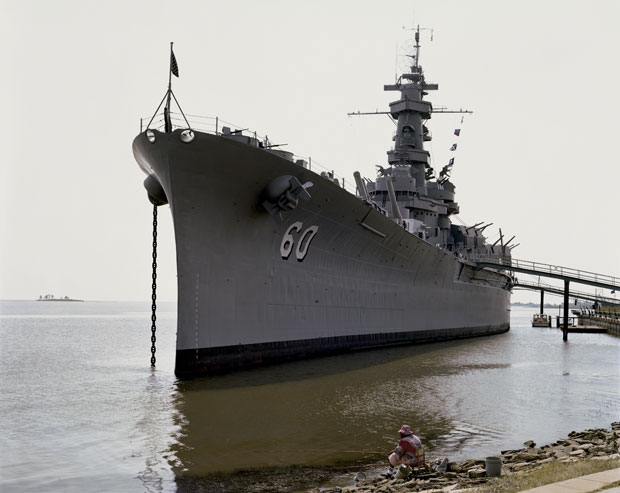There’s a picture in Beetles and Huxley’s current Joel Sternfeld show that I just can’t shake from my head. The scene is a country road, under a blue sky and flanked by trees and shrubbery that place it in the Pacific Northwest. In the foreground, as the road bends towards us, sits a low-slung white saloon with the word ‘SHERIFF’ marked across its back bumper. The driver’s door gapes wide open, leading us to assume that it has been hastily vacated.
Run your eyes up the picture and you get an explanation as to why. In the near distance, an elephant sprawls out on the tarmac, being hosed down by a woman with a mullet. A small crowd watches the drama as a man in a hat – who may or may not be the casually parked Sheriff – turns his back to the camera, apparently indifferent to the fact he is within a metre of a two-tonne pachyderm.
There’s an obvious question to be asked. What the hell is going on here? The title, Exhausted renegade elephant, Woodland, Washington, June 1979, gives a bit of a hint, but no real explanation is forthcoming. In its obscurity and carnivalesque subject matter, it is almost Boschian, a comparison bolstered by a genius spatial trick. The two focal points of the picture – the abandoned car and the clapped-out elephant – are separated by a good distance of empty road, tricking our eyes into believing that Sternfeld has somehow done away with perspective entirely, as a painter might. If the composition at first seems casual or accidental, you are left in no doubt, after a closer look, that a lot of consideration has gone into it.

USS Alabama Mobile, Alabama, September 1980 by Joel Sternfeld. © Joel Sternfeld. Image courtesy Beetles+Huxley and Luhring Augustine
You could make a similar case for any of Sternfeld’s images of the USA in the 1970s and ‘80s, to which this show is dedicated. These works capture a kind of late 20th-century picaresque, each one equipped with a deft visual punchline: in one, a man in a floppy pink hat sits fishing on the muddy bank of a river, his frame dwarfed by a vast warship at anchor in the near distance; another gives us an epic Idaho landscape, with vast hills peppered with fir trees soaring into the endless distance. So grand is the setting that it takes a while to register the slightly sad looking caravan listing a little to the side in the foreground.
I could go on like this forever, but instead can only implore you to visit before the show ends its run next week.

Ketchum, Idaho, October 1980 by Joel Sternfeld. © Joel Sternfeld. Image courtesy Beetles+Huxley and Luhring Augustine
*
If you feel as though the last few weeks were hatched from the mind of a particularly addled conspiracy theorist, I would advise a trip to Carroll/Fletcher on Fitzrovia’s Eastcastle Street. The current display – the third instalment of a four-part programme called ‘Looking at one thing and thinking of something else’ – is a blast of intrigue, trickery and suspense.
The first exhibit in the group show is a work by an Austrian art collective called UBERMORGEN. Back in 2000, as the Bush-Gore presidential election approached, UBERMORGEN played a strange prank on the entire American democratic system that provoked outrage across the US media. They set up a website called [V]ote-Auction, on which visitors were encouraged to sell their vote to the highest bidder. The site, the group mischievously claimed, would ‘cut out the middleman’ of democracy – that is to say, the political consultants paid vast amounts of money to make candidates for election look good enough to vote for.
The site was taken down, but the very fact that it had existed caused a degree of soul-searching amongst the commentariat of the USA. Look at the installation here and you see the seeds of 2016. You do wonder, though, quite how facetious UBERMORGEN were being.













![Masterpiece [Re]discovery 2022. Photo: Ben Fisher Photography, courtesy of Masterpiece London](http://zephr.apollo-magazine.com/wp-content/uploads/2022/07/MPL2022_4263.jpg)
‘Like landscape, his objects seem to breathe’: Gordon Baldwin (1932–2025)